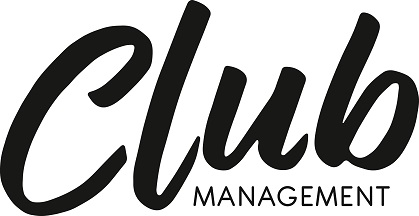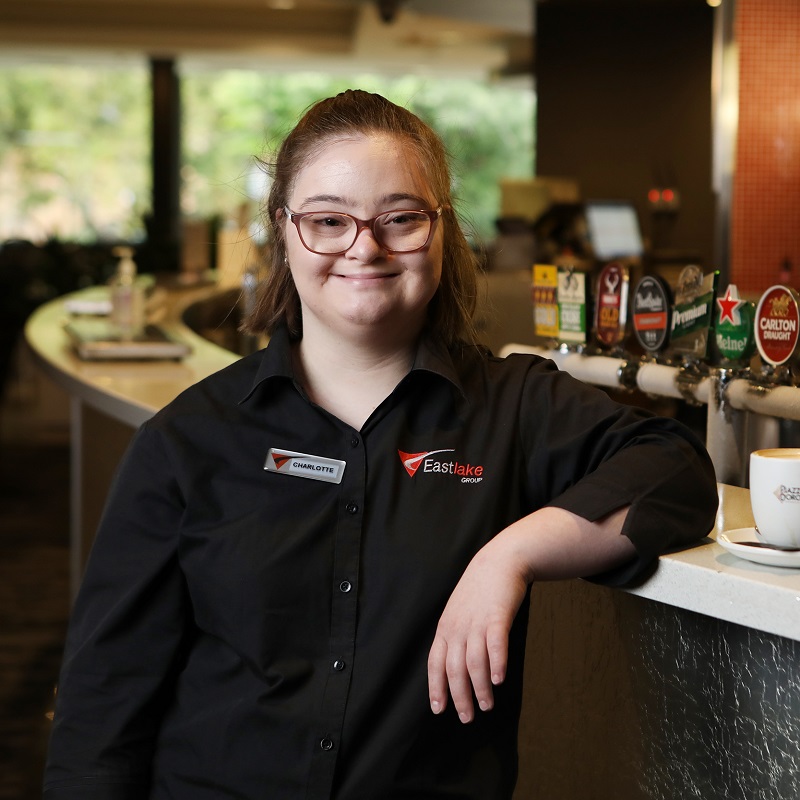When Charlotte Bailey steps behind the counter at Eastlake Football Club, she’s not just making coffees and serving meals, she’s setting a standard for how clubs can lead the way in inclusive employment.
Bailey, who lives with Down syndrome, has been employed by the Eastlake Group in Canberra for the past five years, during which she has worked at two of the group’s venues, Eastlake Football Club and Eastlake Gungahlin.
“I like everything about my job but if I had to choose, I would say the best part is making coffees and serving meals because I get to talk to people,” she told Club Management.
When she’s not at the club, she’s an admin assistant at the ACT Down Syndrome and Intellectual Disability Association. She’s also an advocate for fair wages and employment rights for people living with disability, an issue which has been brought into sharp focus by Down Syndrome Australia’s newly launched Right To Work Campaign.
“The Right To Work campaign came about because Down Syndrome Australia wanted to highlight the significant issues in employment for people with Down syndrome,” Down Syndrome Australia said.
“We undertook polling this year which found that 85 per cent of people were not aware that people with Down syndrome can be paid as little as $3 an hour, so we created the campaign to raise awareness and support with the public, calling on the federal government could take action to address this issue.”
Bailey is one of those lending her voice to that campaign.
“It’s not fair that people who have a disability are getting paid $3 an hour,” she said.
“I would say it’s not right. If you do the same work like everybody else, you should be paid the same. If you want to work hard and do a good job, $3 an hour is not enough money.”
At Eastlake, she is paid a fair wage, something acting chief executive Craig Goddard said is fundamental.
“It is very important that Charlotte is paid a fair wage,” he said.
“She is performing the same work as anyone else, and it is essential that employees are compensated fairly for the work they do. Ensuring a fair wage is not only the right thing to do but also reflects a commitment to ethical employment practices.”
Goddard said he was “shocked” to learn that some Australians with disabilities are still being paid as little as $3 an hour.
“All employees should be compensated fairly for the work they perform. It’s disheartening to know that in some cases, individuals with disabilities are being undervalued in the workplace. This is something that needs to change,” he said.
The Right to Work campaign is calling on the government to phase out $3 wages by 2034, as recommended by the Disability Royal Commission, and fund programs that help people with Down syndrome find and keep work in open employment settings, as well as make changes to the Disability Support Pension.
“The impacts of having a low wage will differ from person to person,” said Down Syndrome Australia.
“In practical terms it can mean that people with Down syndrome don’t have a level of financial independence to meet their needs. The Disability Support Pension, which many people with Down syndrome receive, is also below the poverty line. So, a pension below poverty line, and $3 wages, combines to make it challenging to afford the cost-of-living.”
The organisation is also encouraging clubs and other employers to get involved.
“We welcome employers from the club sector to speak to Down Syndrome Australia if they would like support to place people with Down syndrome into their club. We have tailored programs that support both the person with Down syndrome, and the employer, to have a great experience,” the organisation said.
“Otherwise, we would welcome support for our campaign, such as through signing and sharing our petition. By growing awareness and support for change, we know the government will need to act to address this community concern.”
Goddard believes the club industry is well placed to lead.
“By ensuring that individuals with disabilities are paid fairly and are given equal opportunities, clubs can help to set a standard for other employers,” he said.
“The sector can raise awareness of the importance of fair wages and inclusive workplaces for people with disabilities.”
Charlotte agreed. “Always give people with disabilities a go!”
For more information: www.downsyndrome.org.au/right-to-work
This article first appeared in Club Management Winter. Read more articles from the issue below.

